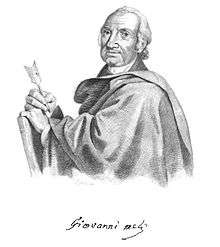Giovanni Meli
Giovanni Meli (4 March 1740, in Palermo – 20 December 1815) was an Italian poet. After studying philosophy and medicine he worked as a doctor in Cinisi in the province of Palermo. It was during this early period of his life that he discovered the bucolic poets and the poetic worth of his native Sicilian which he used thereafter in all of his literary works.

Works
His first published piece, La Bucolica (1766-1772), was inspired by Arcadia by Jacopo Sannazaro. It was written while he was still working as a doctor in Cinisi.
He returned to Palermo soon after, already widely known as a scientist and poet. He dedicated the rest of his life to both collecting works of Sicilian poetry, but most importantly, writing and publishing his own works. His Poesi siciliani in five volumes was published in 1787, and an edition in six volumes was published in 1814.
Besides La bucolica, these collections also contain examples of his satirical verse, such as: La fata galanti (The courteous fairy, 1762); Don Chisciotti e Sanciu Panza (Don Quixote and Sancho Panza, 1785-1787, a parody inspired by Miguel de Cervantes' Don Quixote); Favuli murali (moral fables, 1810-1814; Origini dû munnu (the origin of the world, 1768); Elegii (elegies) e Canzunetti (little songs).
Example
Don Chisciotti e Sanciu Panza (Cantu quintu)
(~1790)
| Sicilian | English |
|---|---|
| Stracanciatu di notti soli jiri; | Disguised he roams at night alone; |
| S'ammuccia ntra purtuni e cantuneri; | Hiding in any nook and cranny; |
| cu vacabunni ci mustra piaciri; | he enjoys the company of vagabonds; |
| poi lu so sbiu sunnu li sumeri, | however, donkeys are his real diversion, |
| li pruteggi e li pigghia a ben vuliri, | he protects them and looks after all their needs, |
| li tratta pri parenti e amici veri; | treating them as real family and friends; |
| siccomu ancora è n'amicu viraci | since he remains a true friend |
| di li bizzarri, capricciusi e audaci. | of all who are bizarre, capricious and bold. |
References
- Herbermann, Charles, ed. (1913). . Catholic Encyclopedia. New York: Robert Appleton Company. Accessed May 17, 2007